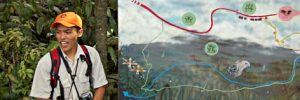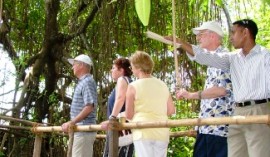Project Summaries
How Are We Making a Difference?
Utilizing ecotourism as an effective tool for bio-cultural conservation, TIES is committed to promoting and supporting efforts in leading sustainable change in the global tourism and travel industry. Our ecotourism initiatives address crucial needs to promote authentic ecotourism, and to give back to the global ecotourism community. Through various ecotourism projects and initiatives, TIES aims to: increase awareness of ecotourism and responsible travel; expand learning and professional development opportunities; connect travel professionals and ecotourism stakeholders; and help shape policy to mainstream sustainability in tourism.
Project Summaries
Over the years, TIES has undertaken a variety of projects financed by both international agencies (such as InterAmerican Development Bank, World Bank, UN Environment Programme, and USAID) as well as by philanthropic foundations (such as Ford Foundation, MacArthur Foundation, and Summit Foundation) It has also engaged in variety of partnership projects and programs with other NGOs, international agencies, and the private sector.
Ecotourism and Sustainable Development in El Salvador (2008)
The aim of this collaborative project by TIES and FUNDEMAS (the Business Foundation for Social Action) in El Salvador was to establish a national strategy for the sustainable development of tourism through effective partnerships among various stakeholder groups and decision makers.
University of Central Asia Professional Training Course (2006)
TIES, in collaboration with Fachhochschule Eberswalde in Germany, developed a professional training course specifically for local tour operators in the mountain areas of Kazakhstan, the Kyrgyz Republic and Tajikistan, with the aim of fostering sound ecotourism development and operation in Central Asia. In these fragile mountain environments the provision of guidelines and standards as well as training and technical assistance will serve to protect local ecosystems from misuse and to promote sustainable economic growth. TIES’ efforts were two-pronged: course development and staff development.
As the leader in generating and disseminating information about ecotourism, TIES is developed the course concepts, program curriculum and teaching materials for UCA. Modules such as “Characteristics of Mountain Tourism,” “Product Design and Services,” and “Sales, Marketing and Public Relations” will figure prominently in the curriculum and will be rooted in the principles and practices of ecotourism. Additionally, material will be employed from the University of Eberswalde’s Sustainable Tourism Management Masters’ program and Windhorse College’s (Ulaan Baatar/Mongolia) Bachelors’ program in Travel and Tourism Management.
Cognizant of the fact that UCA will not likely be able to recruit lecturers and instructors already fully qualified for the specialized program, TIES focused on developing a “Train-the-Trainers” course. This intensive two-week training course helped the lecturers to master the course material and to develop different and innovative teaching methods. Such teaching methods should be decidedly hands-on, with a strong emphasis on practical work rather than lectures. These alternative methods include moderated discussions, role plays, field work, and project work. The training course will end with an exam to gauge the extent of knowledge each participant has gained.
Ecotourism: A Tool for Development in Ukraine (2005)
TIES, in partnership with the US-Ukraine Foundation, has been working to raise awareness about sustainable tourism and ecotourism in Ukraine. Prior to project implementation, TIES made presentations on sustainable tourism and held consultations with various Ukrainian delegations in Washington DC and found strong interest in using Ukraine’s natural and cultural richness to strengthen and expand its tourism sector. With the political situation now officially stabilized, many Ukrainians see an opportunity to increase international tourism.
In 2005, the TIES Team conducted a series of one-day workshops on sustainable tourism in Central and Southern Ukraine, including in Kherson, Voznesensk (Mykolayiv Oblast), Bilohorsk (Crimea), and Balaklava (Crimea). The workshops served to highlight the basics of sustainable tourism and ecotourism, to provide an understanding the market, the value of planning and the importance of securing full participation of key stakeholders, as well as identify next steps for project development. While the audiences varied at each workshop, they included several mayors and other local government officials, tourism professionals, students, NGO representatives and local business owners.
In addition to the workshops, TIES carried out a rapid field assessment consisting of site visits and interviews in the workshop locations, as well as in Kyiv and Western Ukraine. In Western Ukraine areas such as Lviv, Carpathian Mountains, Yaremcha, Zhovkva and Hrytsiv proved to be promising destinations for both ecotourism and sustainable tourism activities. The people and organizations we interviewed showed great enthusiasm for the topic. With the data collected during this project TIES and the US-Ukraine Foundation can develop a strategy and identify funding to provide ongoing expertise, training, and capacity-building related to the strengthening of sustainable tourism and ecotourism within Ukraine. In a long-term perspective, TIES hopes to encourage Ukraine to officially adopt a commitment to development of sustainable tourism.
Key outcomes from this pilot project:
- Successful completion of workshops and evaluation of them;
- An assessment of the products, capacity, and needs of the tourism sector;
- An assessment of potential funding sources for ongoing capacity building;
- An assessment of potential partner organizations which could collaborate in ongoing capacity building or other activities; and
- A listing of logical next steps based on the needs assessment and other information gathered.
Sustainable Tourism in Northern and Central Montenegro (2005)
TIES undertook a consultancy for Rockefeller Brothers Fund and the UNDP to further assess the potentials for sustainable tourism development in the central and northern regions of Montenegro.
The purpose of this project was three-fold: 1. To assess, through a review of relevant reports and site visits, Montenegro’s progress towards implementation of the Strategic Framework for Development of Sustainable Tourism in Northern & Central Montenegro, which was officially adopted by the government in September 2004. 2. To analyze, including site visits, the viability of ski resort development in the Zabljak-Durmitor area, as proposed in the report, Program for Development of Mountain Tourism in Montenegro by the International Institute for Tourism (IIT) in Ljubljana, Slovenia. This report was commissioned by the Ministry of Tourism, which has been promoting it as the model for tourism development in the northern region of Montenegro. 3. To provide information on the current best practices in ski resort development in North America and, where information is available, in Europe.
The site visits, interviews, and review of various tourism reports, have provided a more complete understanding and assessment of the potential for:
Summer tourism in northern Montenegro and the range of agriculture and nature-based activities;
A wider variety of lower cost winter activities;
The possibilities for linking coastal and northern tourism;
Sustainable tourism potential in and around Cetinje, along parts of the coast, and at Lake Skadar; and
Various sustainable tourism projects currently being run by local NGOs and international development agencies.
This consultancy produced a report titled, “Implementing Sustainable Winter and Summer Tourism in Northern and Central Montenegro: An Assessment of Current Strategies and Next Steps” based on recent site visits and interviews, as well as a review of a wide variety of tourism reports and correspondence from experts. It is intended first, to help assess the potentials for both winter and summer tourism, second, to present the recommendations for expanding ski resort tourism contained in the IIT’s Program for Development and third, to discuss where Montenegro is in terms of implementation of the Strategic Framework for Development of Sustainable Tourism in Northern & Central Montenegro.
There is a need not only to try to prevent ill-advised projects that are put forth as part of a sustainable tourism strategy, but also to provide concrete assistance in building Montenegro’s capacity to tap into the strong European and North American demand for sustainable tourism. This paper provides an outline of what appear to be the most promising and urgent needs and issues related to expanding and upgrading sustainable tourism, particularly in the Zabljak-Durmitor region.
Sustainable Tourism Certification, Cat Ba Island, Vietnam (2004)
Through the Vietnam Coastal Biodiversity Support program, led by Flora and Fauna International (FFI), TIES developed monitoring and local certification programs as well as user guides and technical assistance manuals for the region.
Vietnam is experiencing rapid tourism growth and, while there is potential for positive development, many of the negative environmental and cultural impacts have emerged on Cat Ba Island. The International Ecotourism Society (TIES) has worked to raise both regional and local awareness about eco-certification of hotels and ecotourism in Vietnam. Through the Vietnam Coastal Biodiversity Support program, led by Flora and Fauna International (FFI), TIES developed monitoring and local certification programs as well as user guides and technical assistance manuals for the region.
TIES provided certification program development, assessment, monitoring, auditing, and corporate governance and offered technical input on the appropriate environmental certification criteria for waste management, energy minimization and water consumption. TIES was responsible for training of FFI staff on environmental certification programs assessment and auditing.
In line with its mission of improving the well-being of local people, TIES supplied input into community-based tourism (CBT) structures, a proposed community fund and development priorities, in addition to relevant standards for providing returns to local community and conservation efforts. TIES also provided input and contacts for the two-day national conference on ecotourism and eco-certification of hotels that was held July 14-15, 2004 as well as facilitating of local workshops, stakeholder consultation sessions and individual interviews with Government bodies.
Biodiversity Footprint of Ecolodges (2003-2004)
Between October 2003 and January 2004, TIES was contracted by the International Finance Corporation (IFC, the private sector arm of the World Bank) to assess the biodiversity “footprint” of nature-based lodges at a global and national level. As part of this $46,000 project, TIES identified some 400 nature based lodges globally through a web and guide book based survey. TIES sent these lodges a detailed survey to compile data on the current practices of the nature lodges operating in developing countries with significant nature tourism offerings.
It received 106 completed surveys and these were used to compile a wide range of analysis on the social and biological impacts and contributions of nature-based lodges. In addition, TIES used leading guidebooks to compile lists of nature-based lodges within 60 developing countries. TIES then utilized GIS, to plot these lodges on a series of maps and to then to display the resulting information on a global map. Finally, based on the above research and a literature review, TIES developed a matrix of criteria for monitoring and evaluating the environmental, socio/cultural, and economic impacts of nature-based lodges.
The ultimate goal is to help the IFC establish better criteria for future funding of small and medium scale nature-based lodges. This study is part of a longer term project under the Global Environment Fund (GEF) that seeks to establish criteria and mechanisms to support biodiversity conservation and social development through providing financial assistance to new small and medium size nature-based hotels and lodges in developing countries.


